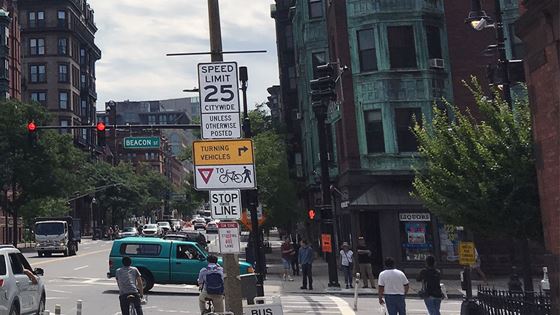Here's some encouraging news for cities trying to reduce speeding: New research from the Insurance Institute for Highway Safety shows that lowering posted speed limits appears to be effective at reducing driver speeds.
The IIHS study compared speeds before and after Boston lowered its speed limit from 30 mph to 25 mph in January, 2017 — and the results were clear: "Vehicles exceeding 25 mph, 30 mph, and 35 mph all declined at sites in Boston, with the largest reduction in proportions of vehicles exceeding 35 mph," wrote the study authors Wen Hu and Jessica Cicchino.
In fact, the odds of a Boston driver exceeding 35 miles per hour after the speed limit change decreased 29 percent and that a driver would exceed 30 mph declined 8.5 percent (the study offered "odds" because it tracked speeds at specific sites rather than following the same drivers before and after the change).
The study did not examine the impacts on crashes, but prior research shows that slower speeds reduce collisions, said Hu and Cicchino.
IIHS President David Harkey said in a statement that the study should encourage other cities to adopt lower speed limits to reverse the dramatic increases in pedestrian fatalities that have occurred over the last five years. Cities like Seattle, Portland and New York that have lowered their speed limits in recent years.
Two Boston City Council members — Ed Flynn and Frank Baker — have proposed lowering speed limits in the Hub even further, to 20 miles per hour.






